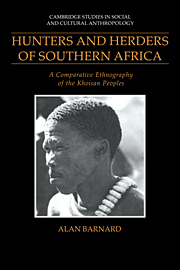Book contents
- Frontmatter
- Contents
- List of figures and maps
- List of tables
- Preface
- A note on orthography
- Part I The Khoisan peoples
- Part II A survey of Khoisan ethnography
- 3 The !Kung
- 4 The !Xõ and Eastern ≠ Hoã
- 5 The Southern Bushmen
- 6 The G/wi and G//ana of the central Kalahari
- 7 The Eastern and Northern Khoe Bushmen
- 8 The Nharo
- 9 The Cape Khoekhoe and Korana
- 10 The Nama and others
- 11 The Damara and Hai//om
- Part III Comparisons and transformations
- References
- Index
- Cambridge Studies in Social and Cultural Anthropology
8 - The Nharo
Published online by Cambridge University Press: 05 June 2012
- Frontmatter
- Contents
- List of figures and maps
- List of tables
- Preface
- A note on orthography
- Part I The Khoisan peoples
- Part II A survey of Khoisan ethnography
- 3 The !Kung
- 4 The !Xõ and Eastern ≠ Hoã
- 5 The Southern Bushmen
- 6 The G/wi and G//ana of the central Kalahari
- 7 The Eastern and Northern Khoe Bushmen
- 8 The Nharo
- 9 The Cape Khoekhoe and Korana
- 10 The Nama and others
- 11 The Damara and Hai//om
- Part III Comparisons and transformations
- References
- Index
- Cambridge Studies in Social and Cultural Anthropology
Summary
The Nharo and their neighbours
The Nharo live in the western part of Botswana's Ghanzi district, between the !Xõ, to the south, and the !Kung, to the north. The Nharo number at least 6,000. Guenther (1986b: 1) has put their number at 9,000, including 5,000 in Botswana and 4,000 in Namibia. By Guenther's estimates, the total is nearly one-fifth of the entire Bushman population, which he gives as 55,000. Their first prominent ethnographer, Dorothea Bleek, called them Naron (the final -n being a common gender plural suffix), and indeed Naro- is a phonologically more precise form than Nharo. I prefer Nharo myself, as it is more common, and indeed not entirely inaccurate, since, as Traill (1988: 157) has noted, the h ‘reflects the breathy voice that can accompany the initial low-toned syllable’.
In most Nharo areas there is a relatively good water supply, due partly to their locations along Ghanzi ridge. This is a mixed sedimentary and volcanic formation some 100 to 150 kilometres wide, with much watertrapping limestone. It runs across the Kalahari, with the main road from Maun and Sehitwa to Sandfontein at its centre (see Figure 8.1). Since the 1890s the Nharo have had to share much of the eastern part of their country (the Ghanzi farm block) with white, and more recently black, ranchers. A separate ranching area (the Xanagas block) lies to the west, on the Namibian border. Most of the ranchers here are of mixed white–black ancestry, and some are part Nama.
- Type
- Chapter
- Information
- Hunters and Herders of Southern AfricaA Comparative Ethnography of the Khoisan Peoples, pp. 134 - 155Publisher: Cambridge University PressPrint publication year: 1992



